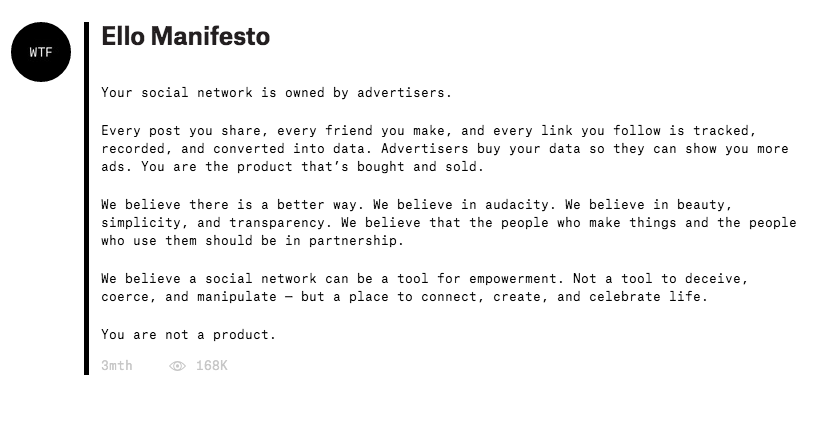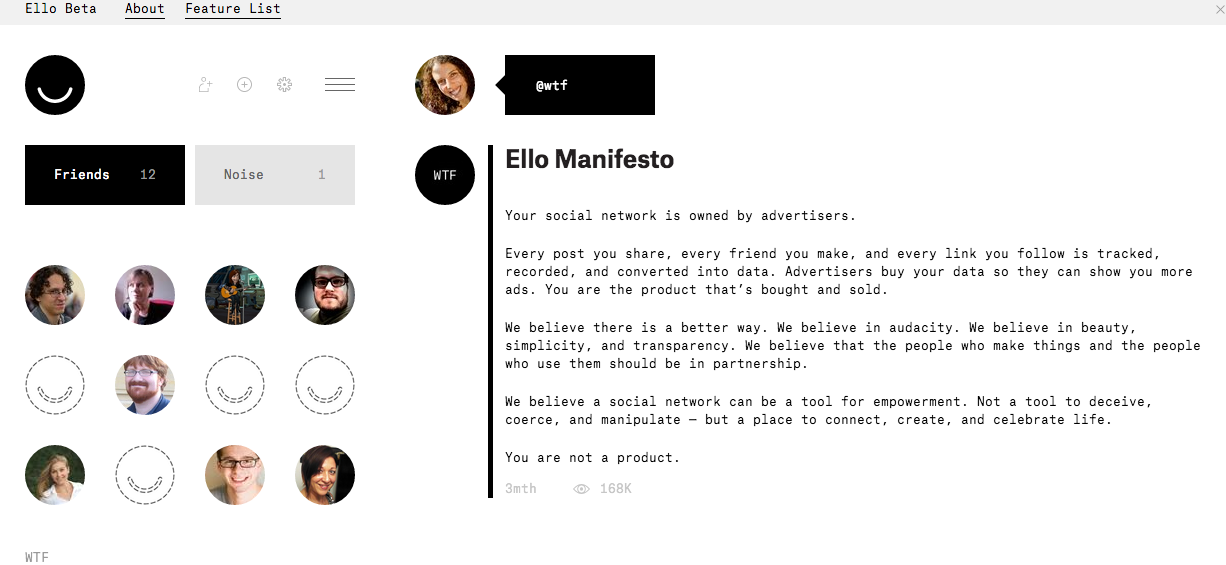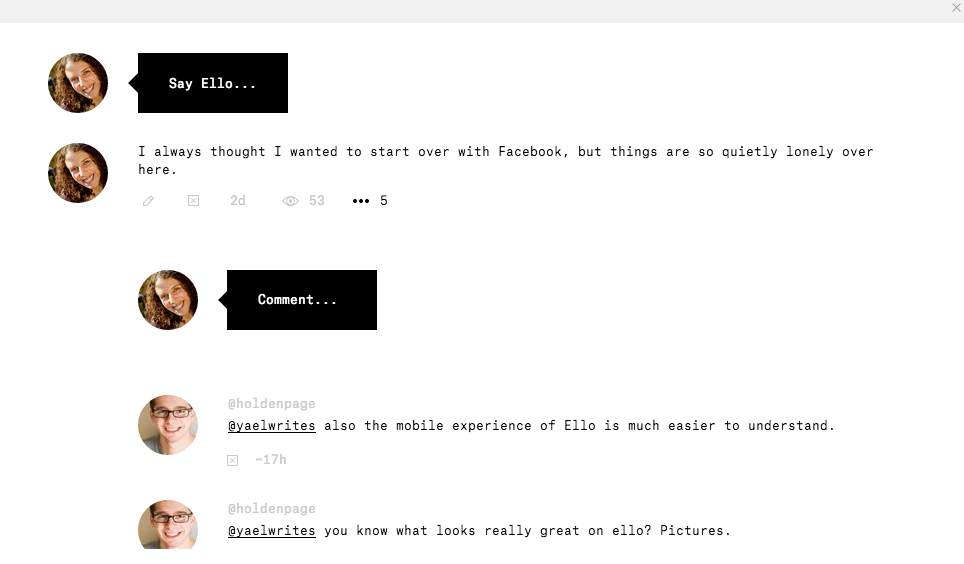
Hello Ello: What You Need to Know About This New Social Networking Site
In Facebook’s decade-long quest for market saturation, the social networking behemoth has many users questioning the site’s validity. Privacy concerns and experiments have users complaining. Some feel inundated with advertising. Facebook’s continuous algorithm updates and the necessity to pay for boosted posts and ads in order to garner page engagement also has many businesses groaning. Is a new social networking site the solution to the seemingly-growing list of Facebook concerns? Let’s find out:
Hello Ello
Ello is a new social networking site, now in beta, which apparently sees the growing discontent with Facebook as a marketing opportunity. In its manifesto, Ello promises not to sell user data to advertisers or allow advertisements. In addition, pseudonyms are permitted.
Ello was founded by Paul Budnitz and Todd Berger. Budnitz, who is also CEO, describes himself as an artist, designer, author, filmmaker and serial entrepreneur. According to Ello’s “About” page, the site was originally created by seven artists and programmers as a private social network, and then made public because so many people wanted to use it.
Demand is high
It’s not been easy to get on Ello, as it’s been inundated with tens of thousands of requests each hour. Those interested in joining may request an invite on the site, but those invitations are slow in coming. With tens of thousands on the wait list and Ello only inviting small batches of users at a time, an invitation may take weeks or months. The quickest way to gain access to the site is to procure an invitation from a new user, but users can only invite five friends.
People are flocking to Ello in droves, but it’s worth noting that many new social networks often had a large initial surge, but later fizzled and died. Diaspora, Path, and app.net are chief among them, and even Google+ never materialized in the way expected. Whether Ello will become a viable alternative to Facebook remains to be seen. However, it has tapped into negative public sentiment towards advertising.
Ello is not advertiser-friendly
Because the primary selling feature of Ello is to keep advertisers out, it may not be the best bet for small businesses. “We built Ello because virtually all the other social networks were cluttered, ugly, and full of ads,” the site reads. “We began to feel manipulated by the networks themselves – many of our posts were never seen by our friends at all, because ads had taken priority. We came to realize that a social network that has ads is a social network created for advertisers, not for people. Every move we made was tracked and recorded, and every post we made was read and sold to other companies so they could show us more ads. It wasn’t fun any more [stet].”
In its FAQ section (which they call WTF), Ello points out they key difference between it and Facebook loud and clear. It reads:
“Virtually every other social network is run by and for advertisers. Behind the scenes, armies of ad salesmen and data miners track and record every move you make. Data about you is auctioned off to advertisers and data brokers. Under the guise of offering a free service, users of other social networks pay a high price in lack of privacy and intrusive advertising.
You’re the product that’s being bought and sold.
Collecting and selling your personal information, reading your posts, and mapping your social connections for profit is [stet] unethical. Every new feature on an ad-driven network is either a new way to gather more data about you (which can be sold), or show you more ads (which are auctioned), or both.
Ello is totally ad-free. Ello does not sell data about you to third parties, including advertisers and data brokers.”
Ello points out that many social networks started out as ad-free, but then switched gears, modifying privacy policies and selling user information to advertisers. Ello insists it will never do this. However, the site has raised considerable cash in venture capital, and venture capitalists typically want an exit. Ello insists it will stick to a freemium model, making its money off of new features.
However, as designer and social entrepreneur Aral Balkan pointed out in a skeptical post, Ello has raised $435,000 in venture capital, and it’s hard to say whether the type of return investors are looking for will be possible through a freemium model. However, Ello’s founders still own more than 80 percent of the company, so it’s unclear how much impact Vermont-based FreshTracks Capital will have.
Evaluating Ello
Since Ello is still in beta, features are still being built and rolled out. Right now, Ello is fairly minimalist. You can comment on posts, see how many views each post received, and get email notifications and in-stream notifications. Features coming soon include ways to block users, flag inappropriate content, integrate audio and video, create private accounts, and message privately.
Ello does collect some user data anonymously, including location, language, time spent on the site, and the referring website. This shows what people in general do on Ello, but does not trace the behavior back to individuals. Users who are still uncomfortable with sharing anonymous information can turn off analytics completely, or use DNT (do not track) settings on web browsers.
Similar to Twitter’s mute feature, Ello allows users to friend people and then segment them into “friends” or “noise.” But since only a few people are on the network compared to Facebook, being inundated with messages isn’t yet a problem. Still, being able to curate one’s own content rather than being subjected to an algorithm is appealing.
It’s too early to say whether people’s frustration with Facebook and disdain for ads, coupled with Ello’s new features, will create a shift in the social networking landscape. For now, small businesses wishing to reach out to potential users still have plenty of options.
What are your thoughts on Ello? Have you signed up for the new site?
Subscribe to the weekly VR Buzz for more industry trends and tips like this.
© 2014 – 2018, Contributing Author. All rights reserved.






